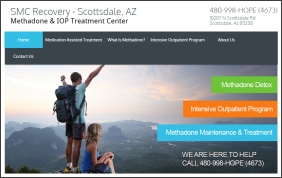 SMC Recovery based in Scottsdale, Arizona opened an outpatient addiction treatment program late last year. SMC provides a Medication-Assisted Program utilizing methadone and an Intensive Outpatient Program. Both treatment modalities are endorsed by SAMHSA as best practices in the field of addiction treatment.
SMC Recovery based in Scottsdale, Arizona opened an outpatient addiction treatment program late last year. SMC provides a Medication-Assisted Program utilizing methadone and an Intensive Outpatient Program. Both treatment modalities are endorsed by SAMHSA as best practices in the field of addiction treatment.
Methadone programs across the USA cover a wide range of prices sometimes as high as $15.00 per day. However, SMC Recovery have implemented one of the most affordable rates in the country at just $55.00 per week. This is an outstanding value for anyone who has been struggling with opiate addiction and it is one of the most competitive rates we have learned of anywhere in the country.
Prospective patients are often unable to get started with outpatient methadone treatment because the cost is just too high for them. SMC Recovery have lowered this barrier considerably. We were informed by their staff that this price will most likely be active over the next year consequently providing numerous Scottsdale area patients an excellent opportunity to see if methadone treatment is beneficial in addressing their addiction problem. SMC’s program offers counseling & support in addition to methadone dosing.

 Follow
Follow

 As we prepare for another new year, there is always this opportunity for welcomed changes and improvements in our lives. New years resolutions are often built around personal goals that people would like to achieve like quitting smoking, losing weight, or beginning a new hobby.
As we prepare for another new year, there is always this opportunity for welcomed changes and improvements in our lives. New years resolutions are often built around personal goals that people would like to achieve like quitting smoking, losing weight, or beginning a new hobby. Jana Burson is a North Carolina physician who specializes in the treatment of opioid addiction using medications like buprenorphine and methadone. Dr. Burson is a passionate caregiver and patient advocate with considerable experience in the field of addiction treatment. She maintains an
Jana Burson is a North Carolina physician who specializes in the treatment of opioid addiction using medications like buprenorphine and methadone. Dr. Burson is a passionate caregiver and patient advocate with considerable experience in the field of addiction treatment. She maintains an  A common question among those seeking help is whether methadone or suboxone is the best choice for opioid replacement therapy. It reminds me of the age old debate … which is better, Ford or Chevy? Methadone has been used in opioid addiction treatment for about 45 years. Suboxone has been available to the public for 12 years. Each of these medications has been shown, through conclusive research, to be highly effective in eliminating opioid withdrawal. Both methadone and suboxone achieve a similar outcome, but with subtle differences. [
A common question among those seeking help is whether methadone or suboxone is the best choice for opioid replacement therapy. It reminds me of the age old debate … which is better, Ford or Chevy? Methadone has been used in opioid addiction treatment for about 45 years. Suboxone has been available to the public for 12 years. Each of these medications has been shown, through conclusive research, to be highly effective in eliminating opioid withdrawal. Both methadone and suboxone achieve a similar outcome, but with subtle differences. [ Access Recovery Solutions (ARS)
Access Recovery Solutions (ARS) 



